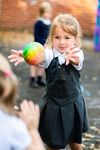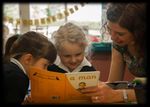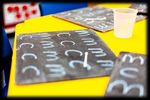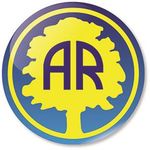STARTING SCHOOL at Abbey Road Primary School
←
→
Page content transcription
If your browser does not render page correctly, please read the page content below
What will my child be doing in Foundation Stage?
We believe that your child will only learn when they are settled and happy. We will work in partnership
with you to ensure that your child is happy and is able to achieve to the best of their abilities as a valued
member of our school.
In the Foundation Stage your child will follow a broad and balanced curriculum and will learn through
practical, play-based activities.
They will cover seven areas of learning:
Three Prime Areas
• Personal, Social and Emotional Development
• Physical Development
• Communication and Language
Four Specific Areas
• Literacy
• Mathematical Development
• Understanding Of The World
• Expressive Arts and Design
All of these areas of learning are underpinned by the Characteristics of Effective Learning.
• Playing and exploring
• Active learning
• Creating and thinking critically
In the Foundation Class your child will take part in a wide range of activities, including:
• Open ended investigations
• Jigsaws and games
• Sand and water play
• Small world play e.g. farm, zoo, train set, dolls house
• Roleplay
• ICT – e.g. iPads, listening centres, interactive
whiteboards
• Design Technology area - design and make their own
creations
• Construction
• Writing area to practise independent writing and mark
making
• Malleable materials - play dough, clay etc
• Outdoor play
• Creative activities
• Physical play
• Music and dance• Children also have sessions of ‘Dough Disco’ and ‘Squiggle’
(arm and hand movements to help them write). They also
have a phonics session and maths session every day and
they read to an adult in school once a week.
GETTING YOUR CHILD READY FOR SCHOOL
It would really help your child to have a stress-free start to
school if he / she can confidently do the following. We will
support your child if they do need help.
• Fasten/unfasten his/her own coat
• Dress/undress for P.E
• Use the toilet and wash and dry hands
• Use a knife and fork correctly
• Pack his / her own bag
• Play turn-taking games
• Use a pair of small scissors to cut out
It is appreciated if your child can;
• Remember to say “please” and “thank you”.
• Wait his/her turn.
TASKS YOU CAN PRACTISE WITH YOUR CHILD AT HOME.
• To recognise their own name.
• To recognise and name colours.
• To sing several nursery rhymes.
• To count up to 10 objects, moving them as you count.
• To recognise some numbers.
The link below is filled with really good, helpful information about starting school.
https://www.bbc.co.uk/bitesize/collections/starting-primary-school/1
When your child starts school, remember to check the school website for updates. The foundation stage
team update the class page on a weekly basis so you will be able to see what your child has been up to!
Foundation – Abbey Road Primary School
HOW WILL MY CHILD LEARN TO READ?
• Your child will begin by first learning the 26 sounds (phonemes) in the alphabet. This will be taught
using the rhymes from the Read, Write, Inc scheme.
• Your child will be taught to hear the sound at the beginning of words. You can play games to help your
child hear the sounds, e.g. collect items that begin with a certain letter from around the house. Eg: “I
Spy.”
• Once your child can remember some of the sounds with the picture cues, you can take away the
pictures and begin to look at just the written letter (grapheme) and make the sound (phoneme). Usethe picture cards to help your child remember the sound until they eventually will be able to do it
without them.
• The first sounds that your child will be taught are m a s d t
• Once your child recognises some of the letter sounds, they will begin to blend the sounds together to
sound out simple three letter words, e.g. s-a-t, s-a-d, m-a-t
• In the Foundation Stage there are 45 key words that the children need to be able to read. These words
will come up regularly in their reading books. Flash cards will also be sent home, a set of nine words
at a time. You can play snap and matching games to help your
child remember the words. Please practise these words little
and often, five minutes every night is more beneficial than 20
minutes all in one go.
• Your child’s reading books will be changed as appropriate.
Please use the reading diary to communicate with your child’s
teacher and to let the teacher know your child has read at
home. Please add extra comments to let us know how they’re
getting on.
• Reading books more than once is very valuable. When a child
reads or hears the same book multiple times, they become
familiar and comfortable with a greater number of words and
this helps them to develop fluency.
• Alphabet jigsaws and games, phonics play website and books
can also be used to assist your child at home.
TOP TIPS WHEN READING WITH YOUR CHILD.
DO:
✓ Praise your child continually. Tell him/her how well
they are doing and how pleased you are with them.
✓ Find somewhere warm, cosy and quiet to read.
✓ Look at the title and count the words and letters in it.
Remind your child that each word has a finger space
between it.
✓ Talk about the story and the pictures.
✓ Encourage your child to point to each word as they
read.
✓ Encourage your child to sound out words, when
possible.
✓ Encourage your child to use phonic and picture cues to
attempt a word
✓ Encourage your child to read signs when you are out,
ASDA or McDonald’s may well be among the first
words your child recognises!
✓ Use the library and read lots of different books to your child, comics, information books, poems and
picture books.DO NOT:
• Get cross with your child’s efforts
• Do anything else at the same time. (turn off the TV etc)
• Let your child struggle
• Correct errors immediately, give your child time to realise errors for themselves.
Encouraging Early Writing Skills
It is important to do activities that use a child’s fingers and hands
to develop fine motor control before beginning to write. These
include jigsaw puzzles, threading beads and cards, construction
toys, dressing dolls, painting, drawing, colouring, art kits, fastening
clothes, handling small objects, (e.g. small Lego, jewellery making
kits.) Using big tweezers to pick up objects develops the pincer grip
they need and using their fingers to pick up small objects, e.g.
sorting beads, sequins, sorting rice from lentils, to name but a few.
It is very important that your child
holds their pencil in the correct way
once they are ready to write.
The pencil should be held in the
tripod grip between the thumb and
the first two fingers. If a child’s hold
starts incorrectly it is very difficult to
correct later.
It is also vital that letters are formed
correctly from the start. Please
monitor starting points and
directions.
This is how we form the letters in
the alphabet. We teach lower case
letters first.MATHEMATICAL DEVELOPMENT
Encourage early mathematical skills by talking with your child about numbers, patterns and shapes.
Have a go at:
• Counting everyday objects by moving them as you count.
• Finding numbers on packaging.
• Look for numbers on house doors, road signs etc.
• Recognising numbers and matching objects to
them.
• Playing with real money to recognise coins.
• Naming and talking about the shapes of objects
around them.
• Understand positional language.
• Make repeating patterns using any objects.
• Bath time activities involving filling, emptying and
half filling containers.
• Baking activities involving weighing ingredients and
counting out spoonfuls.You can also read



























































